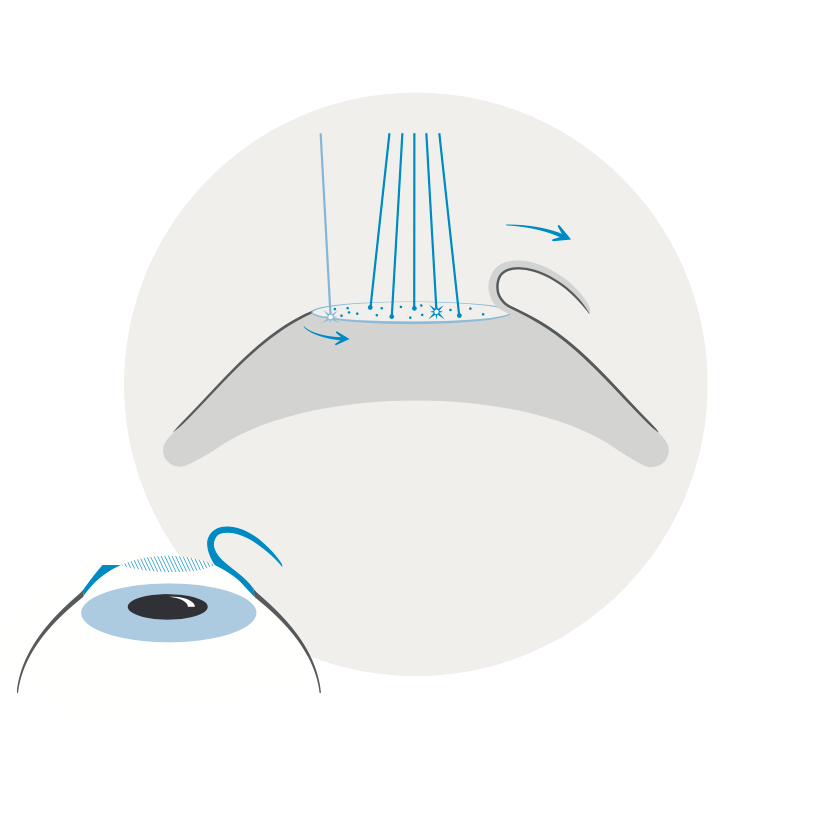LASIK
What is LASIK?

LASIK stands for:
Laser
In Situ
Keratomileuses .
This is a two-step laser eye surgery correction procedure. I use the world’s most technologically advanced and fastest femtosecond laser (Zeiss Visumax 800) to create a flap in the top layer of the cornea (the epithelium and stroma), exposing the tissue bed underneath. The world’s best excimer laser (Zeiss Mel 90) is then used to precisely reshape the corneal tissue bed to correct the patient’s spectacle error. Finally, I meticulously place the corneal flap back in its original position.
Because the flap adheres to the newly contoured corneal bed, the healing process begins immediately. The eye has a remarkable ability to heal itself and patients are able to return to most of their daily activities the next day.

How does the LASIK procedure work?
LASIK suitability criteria:
LASIK laser eye surgery at a glance:
Advantages of LASIK
- With LASIK laser eye surgery, 2 different lasers are used. The femtosecond laser is used to create a thin flap on the cornea and the excimer laser to recontour the cornea to treat the spectacle error of the eye.
- First, I use the Carl Zeiss Visumax 800 femtosecond laser, the world’s most advanced eye laser system, to create a micro-thin flap of corneal tissue on the top surface of your eye.
- I then use highly specialised and sophisticated microsurgical equipment to fold flap back to reveal the internal surface or stroma of the cornea.
- The LASIK flap is created under computer guidance ensuring it is on the centre of your visual axis.
- The flap is created in less than 7 seconds and is completely painless and odourless.
- LASIK is completely painless and invisible to the patient.
- Once the flap is created on the femtosecond laser, I then move the surgical bed to the second excimer laser.
- The excimer laser then reshapes and remould the cornea, treating your spectacle or refractive error.
- I then meticulously and very carefully place the flap back into its original anatomical position.
- Natural forces hold the flap in place until surface healing is complete – usually within 12 to 24 hours. I do not use stitches during LASIK surgery.
In modern LASIK I can safely correct prescriptions of:
- Myopia or near-sightedness up to -8 units
- Hyperopia or far-sightedness up to +6 units
- Astigmatism up to -6 units
For patients who do not fall into the suitability criteria it does not mean that I cannot correct your vision. I usually offer other laser options like SMILE Pro or PRK. In certain cases it might be more suitable to undergo lens based vision correction surgery like ICL or Clear Lens Replacement surgery.
- To be eligible for LASIK you must be over 18 years of age.
- During your preoperative assessment my clinical team and I will examine a multitude of other factors both directly relating to obtaining the highest possible accuracy in your vision correction but also relating to the general health of your eye.
- You should have a stable spectacle prescription for at least 12 months that have not significantly changed by more than 0.5 units.
- Your cornea should be of a suitable thickness as the LASIK procedure sculpts the eye and removes corneal tissue. It is advisable that a cornea is at least half a millimetre or 500 microns thick though I can make and create thinner flaps in cases with thin corneas and high spectacle errors.
- During your preoperative consultation you will be asked about your medical history in detail as well as any medications you may be taking. If you have a condition that could affect the process of laser eye surgery my clinical team will discuss these with you and recommend the appropriate additional measures.
- Certain conditions may affect your suitability for surgery or require more specialised care.
These include, but are not limited to:
- Certain degenerative diseases of the cornea like keratoconus
- Severely dry eyes
- Certain auto-immune conditions (e.g. lupus, rheumatoid arthritis, poorly controlled diabetes)
- Pregnancy and nursing
- Generally quick visual recovery
- Most frequently performed laser eye surgery procedure in the world
- Treatment standard for more than 30 years
- Widely available and performed by many surgeons worldwide
- The entire procedure is done with lasers only. Unlike other surgeons I do not use archaic blade surgery to perform LASIK surgery
With LASIK, a flap is created and folded back.
- Extremely accurate and precise up to 0.01 optical units
- The LASIK procedure is completely painless
- In total, I perform a LASIK procedure is less than 10 minutes
- Recovery is usually within 6 hours and patients can expect excellent vision the next day
- Freedom from glasses or contact lenses
- I perform a completely bladeless procedure that is 100% performed with laser technology
- The risk of blindness from contact lenses is completely eliminated
- Recreational activities are more enjoyable and can be performed without glasses
- LASIK can save you the time and effort of cleaning, removing and inserting contact lenses
- The accumulated costs of maintaining and replacing glasses or lenses is significantly reduced over time
- Some patients also value the cosmetic or aesthetic benefits of being free from glasses

Frequently Asked Questions about LASIK
If you are considering or been recommended LASIK surgery, you probably have many questions.
Some of the most frequent ones are addressed here. This information is not intended to replace consultation with your eye surgeon.
Is LASIK laser eye surgery right for me?
Eligibility for LASIK Laser Vision Correction depends on many factors. Only myself and our clinical optometrists can determine whether LASIK, Femto-LASIK or possibly another treatment option is best suited for you.
What advantages does LASIK laser eye surgery offer?
The fast and highly precise femtosecond laser enables the surgeon to quickly and predictably create a hinged corneal flap without a blade. The patient is then comfortably relocated to the excimer laser to complete the treatment.
Is it safe?
Complications after LASIK or Femto-LASIK surgery are rare, but cannot be completely ruled out. As with all medical procedures, there is always a risk of possible side effects. Your eye doctor will discuss these with you.
Laser eye surgery permanently changes your cornea, but doesn’t protect your eyes from the lens-related vision changes that occur with age (presbyopia), so reading glasses may still be required when you reach your mid-40s.
How do I prepare?
If you wear contact lenses, most surgeons recommend switching to glasses a few weeks before surgery. You are advised not to apply makeup, lotions or perfume the day you have surgery. Also, it is suggested that you arrange to have someone bring you home afterward.
How long does the procedure take?
The treatment procedure itself only takes about 10- 15 minutes for both eyes.
What happens after surgery?
A protective bandage or eye shield is placed over the eye to avoid rubbing it. Eye drops and possibly other medication may be prescribed to prevent infection and aid the healing process. A post-op examination the next day is customary, as are further examinations for the following weeks or months.
When can I return to my normal activities?
You will be able to resume most of your normal activities and return to work within the first week.
How long is the recovery time?
Complete visual recovery usually takes two to three weeks.
What does it cost?
The cost of LASIK at Crystal Eye and Laser Centre is $7200. Most insurance companies do not cover the procedure costs but certain health insurers cover the whole cost or part of the cost on certain plans.
My Mission Statement:
I am dedicated to providing the best clinical expertise and the highest standard of care.
This is on a personal and professional level, to give all my patients of all ages the best opportunity for a lifetime of healthy eyes and excellent vision.
Over the past 20 years I have had the absolute pleasure of helping tens of thousands of patients of various ages improve and maintain their vision. Helping patients to free themselves from the burden of glasses and contact lenses is my passion.
To perform microsurgery on the eyes requires exceptional surgical skill and acumen. To perform all types of eye surgery and any other ocular surgery at a world class level requires expertise along with access to state of the art and the world’s best equipment. For this reason I have spent a total of 17 years training and perfecting my surgical armamentarium and spared no cent to acquire the best and most advanced diagnostic, surgical and laser equipment in the world to provide my patients with world class care.
I understand that getting surgery, especially on your eyes, is a serious decision and can cause anxiety in some. Your eyes are unique, and you should demand a bespoke solution tailored to your lifestyle, visual requirements and goals. That is why I offer the most thorough and intense medical examination and consultation that any patient will ever go through. During your consultation we will meet, and I can take the time to answer all your questions and talk through any concerns you have.
I am passionate about transforming people’s lives by transforming their vision. I look forward to spending time with you at our stunning and state of the art clinics in Booragoon and Craigie to see whether you could gain exceptional vision and eye health
MBChB, DipOphth, FCOphth, FRANZCO, MMed (Ophth), FRCSI, FEBO, GradDip(RefCatSurg), MMed(RefCatSurg), FWCRSVS

Why Choose Me?
More than 20 years of ophthalmological experience
Tens of thousands of satisfied patients
A professional team dedicated to the best outcome for your eyes
Exceptional reviews and word of mouth recommendations
Get in touch with my team
Whether you are ready to take the plunge into a world of crystal clear vision, or just have a few questions for me, feel free to drop me a line.
Own your Vision today!
.
Contact Us
We will get back to you as soon as possible.
Please try again later.
Happy Patients
I'm proud to have earned glowing reviews from patients who I've helped own their vision allowing them to enjoy a life free from the constraints of glasses and contact lenses. I'm humbled by the the overwhelming positive online reviews on Google.


All Rights Reserved | Lourens van Zyl